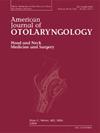以皮质类固醇为基础的联合治疗突发性耳聋的回顾性研究
IF 1.7
4区 医学
Q2 OTORHINOLARYNGOLOGY
引用次数: 0
摘要
目的全身皮质类固醇治疗被广泛推荐为突发性耳聋(SD)的一线治疗方法。然而,影响治疗结果的因素仍然不确定,以皮质类固醇为基础的联合治疗的疗效仍然存在争议。本研究旨在探讨治疗起始时间、患者年龄对治疗效果的影响,并评价高压氧治疗(HBOT)、巴曲酶和针灸联合治疗对治疗效果的影响。方法248例接受糖皮质激素联合治疗的SD患者分为4个亚型。此外,还分析了17例接受鼓室内皮质类固醇(ICT)治疗的患者。评估听力改善和伴随症状(眩晕/耳鸣)以表明治疗的有效性。结果早期治疗(≤7天)和年轻患者(18岁)与较好的预后相关(P <;0.05)。对于联合治疗,巴曲酶和针灸对治疗结果没有显著影响(P >;0.05)。相比之下,接受HBOT治疗的患者在全聋和低频下降亚型中表现出更差的听力改善(P <;0.05)。结论SD患者应重视早期治疗,尤其是年轻患者。联合治疗,尤其是HBOT不能改善预后。补救性ICT可以进一步改善对全身皮质类固醇治疗反应不佳的全聋亚型SD患者的预后。本文章由计算机程序翻译,如有差异,请以英文原文为准。
Effect of corticosteroid-based combination therapy on sudden deafness: a retrospective study
Objectives
Systemic corticosteroid therapy is widely recommended as the first-line treatment for sudden deafness(SD). However, the factors influencing treatment outcomes remain uncertain, and the efficacy of corticosteroid-based combination therapies is still controversial. Aim of this study is to declare the impact of treatment initiation time, patient age and evaluate the combined therapies including hyperbaric oxygen therapy (HBOT), batroxobin, and acupuncture on treatment outcome.
Methods
248 SD patients undergoing corticosteroid-based combination therapy were included and classified into four subtypes. Additionally, 17 patients who received remedial intratympanic corticosteroid (ICT) were analyzed. Improvement of hearing and accompanying symptoms (vertigo/tinnitus) was evaluated to indicate the effectiveness of treatment.
Results
Early-stage treatment (≤7 days) and younger patients (<18 years) were associated with better outcomes(P < 0.05). For combined therapies, batroxobin and acupuncture showed no significant effect on treatment outcomes(P > 0.05). In contrast, patients receiving HBOT exhibited worse hearing improvement in total deafness and low-frequency descending subtypes(P < 0.05).
Conclusions
Early-stage treatment should be emphasized for patients with SD, particularly in young patients. Combined therapies, especially HBOT, cannot improve prognosis. Remedial ICT can further improved outcomes in SD patients with total deafness subtype who responded poorly to systemic corticosteroid therapy.
求助全文
通过发布文献求助,成功后即可免费获取论文全文。
去求助
来源期刊

American Journal of Otolaryngology
医学-耳鼻喉科学
CiteScore
4.40
自引率
4.00%
发文量
378
审稿时长
41 days
期刊介绍:
Be fully informed about developments in otology, neurotology, audiology, rhinology, allergy, laryngology, speech science, bronchoesophagology, facial plastic surgery, and head and neck surgery. Featured sections include original contributions, grand rounds, current reviews, case reports and socioeconomics.
 求助内容:
求助内容: 应助结果提醒方式:
应助结果提醒方式:


